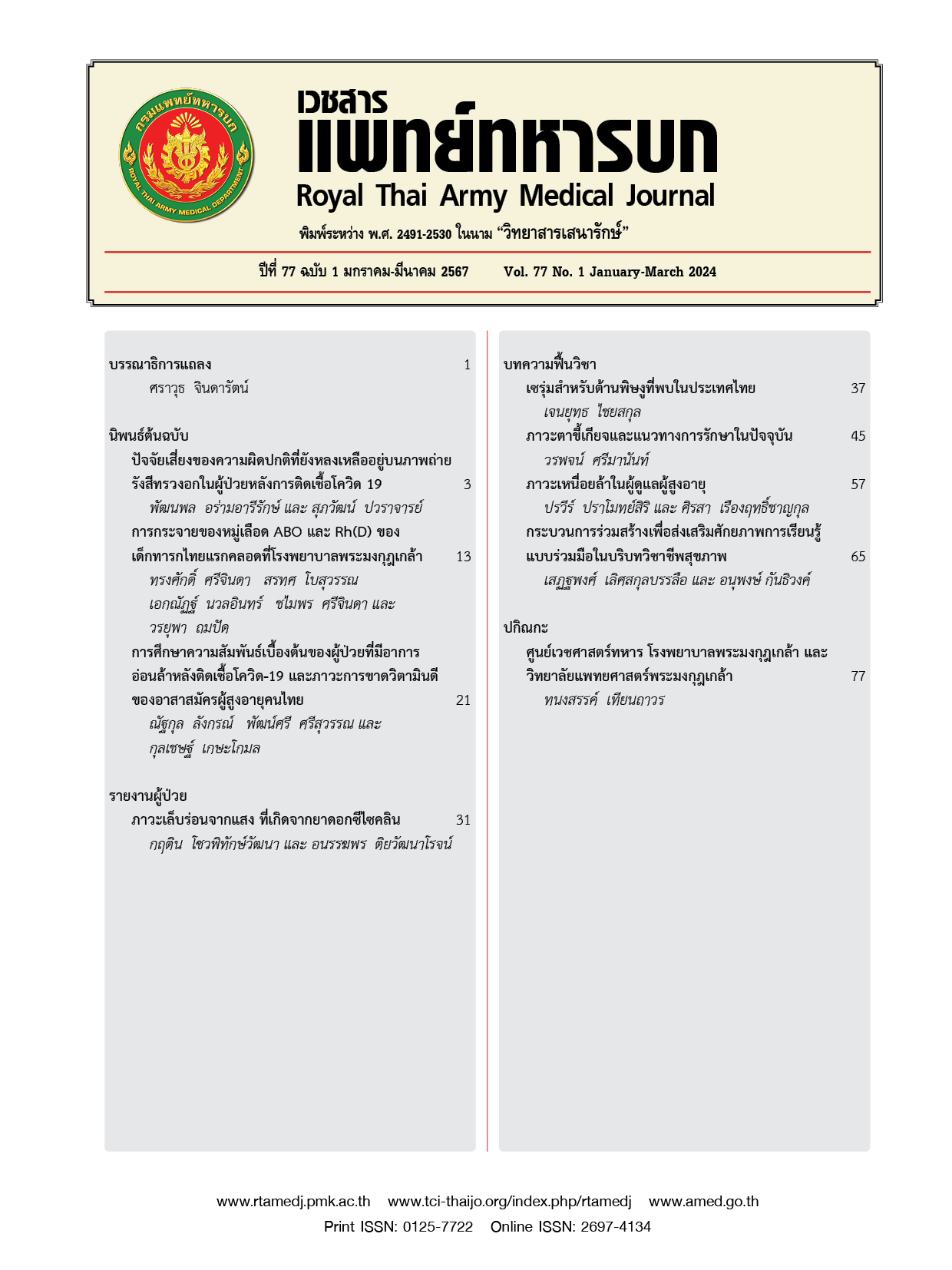ภาวะเหนื่อยล้าในผู้ดูแลผู้สูงอายุ
Main Article Content
Downloads
Article Details

อนุญาตภายใต้เงื่อนไข Creative Commons Attribution-NonCommercial-NoDerivatives 4.0 International License.
บทความในวารสารนี้อยู่ภายใต้ลิขสิทธิ์ของ กรมแพทย์ทหารบก และเผยแพร่ภายใต้สัญญาอนุญาต Creative Commons Attribution-NonCommercial-NoDerivatives 4.0 International (CC BY-NC-ND 4.0)
ท่านสามารถอ่านและใช้งานเพื่อวัตถุประสงค์ทางการศึกษา และทางวิชาการ เช่น การสอน การวิจัย หรือการอ้างอิง โดยต้องให้เครดิตอย่างเหมาะสมแก่ผู้เขียนและวารสาร
ห้ามใช้หรือแก้ไขบทความโดยไม่ได้รับอนุญาต
ข้อความที่ปรากฏในบทความเป็นความคิดเห็นของผู้เขียนเท่านั้น
ผู้เขียนเป็นผู้รับผิดชอบต่อเนื้อหาและความถูกต้องของบทความของตนอย่างเต็มที่
การนำบทความไปเผยแพร่ซ้ำในรูปแบบสาธารณะอื่นใด ต้องได้รับอนุญาตจากวารสาร
เอกสารอ้างอิง
Foundation of Thai Gerontology Research and Development institute (TGRI). Situation of the Thai Older Persons 2021. Nakhon Pathom: Institute for Population and Social Research, Mahidol University; 2021.
The 2021 Survey of The Older Persons in Thailand. Bangkok: National Statistical Office Ministry of Digital Economy and Society; 2022.
Watanabe O, Chompikul J, Kawamori M, Pimpisan N, Visanuyothin S. Predicators of Family Caregiver Burden in Caring for Older People in the Urban District of Nakhon Ratchasima Province, Thailand. J Int Health. 2019;34(4):217-28.
Limpawattana P, Theeranut A, Chindaprasirt J, Sawanyawisuth K, Pimporm J. Caregivers burden of older adults with chronic illnesses in the community: a cross-sectional study. J Community Health. 38(1):40-5.
Ageing and health. World Health Organization. World Health Organization [Internet] 2022 [cited 2023 Apr 14]. Available from: https://www.who.int/news-room/fact-sheets/detail/ageing-and-health
National Alliance for Caregiving and AARP Public Policy Institute. Caregiving in the U.S. [Internet] 2020 [cited 21 Mar 2023]. Available from https://www.caregiving.org/wp-content/uploads/2021/01/full-report-caregiving-in-the-united-states-01-21.pdf.
Being a Caregiver: Johns Hopkins Medicine [Internet] [cited 2023 Apr 14]. Available from: https://www.hopkinsmedicine.org/health/caregiving/being-a-caregiver.
Burden. Cambridge Dictionary [Internet] [cited 2023 Apr 13]. Available from: https://dictionary.cambridge.org/dictionary/english/burden
Zarit SH, Reever KE, Bach-Peterson J. Relatives of the impaired elderly: correlates of feelings of burden. Gerontologist. 1980;20(6):649-55.
Suksatan W, Tankumpuan T, Davidson PM. Heart Failure Caregiver Burden and Outcomes: A Systematic Review. J Prim Care Community Health. 2022;13:21501319221112584.
Henao Piedrahita N, Idarraga Arroyave MM, Londoño Restrepo N, López Ceballos JJ, Ramírez Serna MA, Serna Arango PA, et al. Prevalence of caregiver burden syndrome in formal caregivers of institutionalised patients with psychiatric illness. Rev Colomb Psiquiatr (Engl Ed). 2021;50(2):101-7.
Loo YX, Yan S, Low LL. Caregiver burden and its prevalence, measurement scales, predictive factors and impact: a review with an Asian perspective. Singapore Med J. 2022;63(10):593-603.
Putri YSE, Putra IGNE, Falahaini A, Wardani IY. Factors Associated with Caregiver Burden in Caregivers of Older Patients with Dementia in Indonesia. Int J Environ Res Public Health. 2022;19(19):12437.
Perkins M, Howard VJ, Wadley VG, et al. Caregiving strain and all-cause mortality: evidence from the REGARDS study. J Gerontol B Psychol Sci Soc Sci. 2013;68(4):504-12.
Jansen T, Rademakers J, Waverijn G, Verheij R, Osborne R, Heijmans M. The role of health literacy in explaining the association between educational attainment and the use of out-of-hours primary care services in chronically ill people: a survey study. BMC Health Serv Res. 2018;18(1):394.
Inthai P, Khrueapaeng P, Choksomngam Y, Yingchankul N. Prevalence and factors associated with caregiver burden in caregivers of elderly dependents in San Pa Tong District, Chiang Mai. Chiang Mai Med J. 2021;60(3):383-94.
Yadav N, Jain S, Jain R. A study for comparison of caregiver burden and behavioral and psychotic symptoms in frontotemporal dementia and alzheimer’s dementia. Int J Med Biomed Stud. 2020;4(2):183-5.
Baharudin AD, Din NC, Subramaniam P, Razali R. The associations between behavioral-psychological symptoms of dementia (BPSD) and coping strategy, burden of care and personality style among low-income caregivers of patients with dementia. BMC Public Health. 2019;19(Suppl 4):447.
Del-Pino-Casado R, Frías-Osuna A, Palomino-Moral PA, Ruzafa-Martínez M, Ramos-Morcillo AJ. Social support and subjective burden in caregivers of adults and older adults: A meta-analysis. PLoS One. 2018;13(1):e0189874.
Orfila F, Coma-Solé M, Cabanas M, Cegri-Lombardo F, Moleras-Serra A, Pujol-Ribera E. Family caregiver mistreatment of the elderly: prevalence of risk and associated factors. BMC Public Health. 2018;18(1):167.
Spitzer RL, Kroenke K, Williams JBW, Löwe B. A brief measure for assessing generalized anxiety disorder: the GAD-7. Arch Intern Med. 2006;166(10):1092-7.
Wongpakaran N, Wongpakaran T, Van Reekum R. The Use of GDS-15 in Detecting MDD: A Comparison Between Residents in a Thai Long-Term Care Home and Geriatric Outpatients. J Clin Med Res. 2013;5(2):101-11.
Silpakit O, Silpakit C, Chomchuen R. Psychometric study of the Thai version of Zarit Burden Interview in psychiatric caregivers. J Ment Health Thai. 2015;23(1):12-24.
Psychoeducation - the cognitive and Research Center of New Jersey. CRCNJ [Internet] 2020 [cited 2023 Apr 18]. Available from: https://thecrcnj.com/psychoeducation/
Overview - Cognitive behavioural therapy (CBT). NHS choices. NHS [Internet] 2022 [cited 2023 Apr 24]. Available from: https://www.nhs.uk/mental- health/talking-therapies-medicine-treatments/talking-therapies-and-counselling/cognitive-behaviouraltherapy-cbt/overview/
Mikkola TM, Kautiainen H, Mänty M, von Bonsdorff MB, Koponen H, Kröger T, et al. Use of antidepressants among Finnish family caregivers: a nationwide register-based study. Soc Psychiatry Psychiatr Epidemiol. 2021;56(12):2209-16.
Camargos EF, Souza AB, Nascimento AS, Morais-E-Silva AC, Quintas JL, Louzada LL, et al. Use of psychotropic medications by caregivers of elderly patients with dementia: is this a sign of caregiver burden? Arq Neuropsiquiatr. 2012;70(3):169-74.


